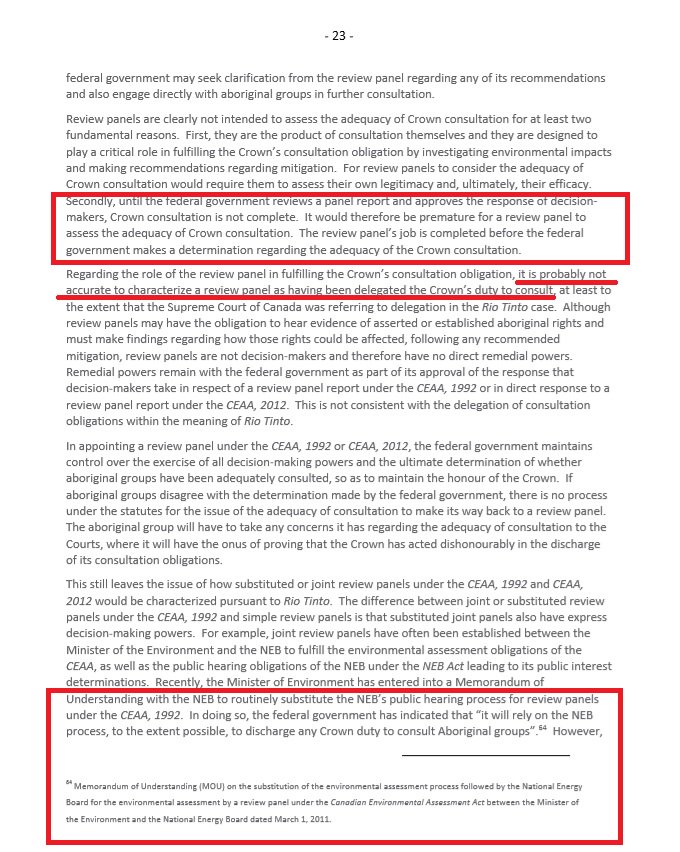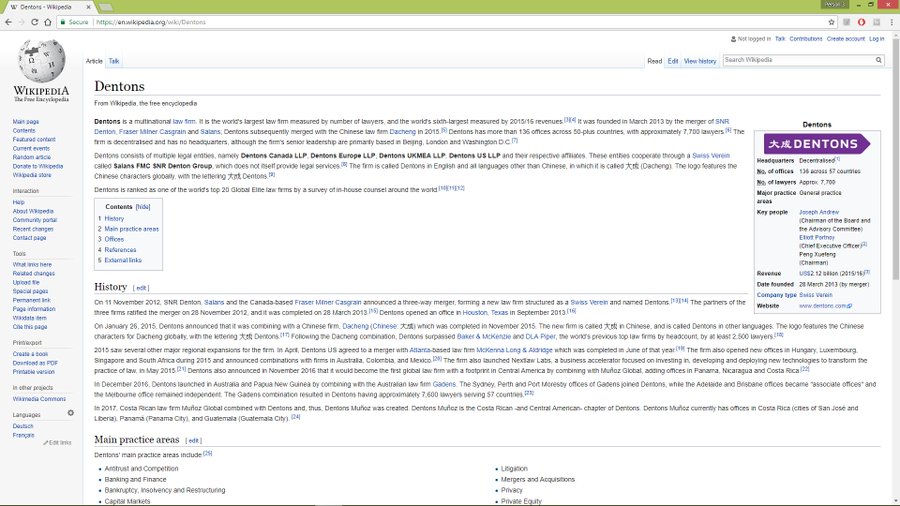A repeal of Section 230 likely would lead to more content moderation and fewer opportunities for user-generated content. To understand why, it's helpful to look at a dispute that Eddie Haskell had with an adult bookstore 40 years ago.



More from Law
This thread will debunk "the judges didn't look at evidence" nonsense that has been going around.
Over and over again, judges have gone out of their way to listen to the evidence and dismantle it, enjoy the carnage!
1/
Bowyer v. Ducey (Sidney Powell's case in Arizona)
"Plaintiffs have not moved the
needle for their fraud theory from conceivable to plausible"
This is a great opinion to start with. The Judge completely dismantles the nonsense brought before her.
2/
https://t.co/F2vllUhM2G
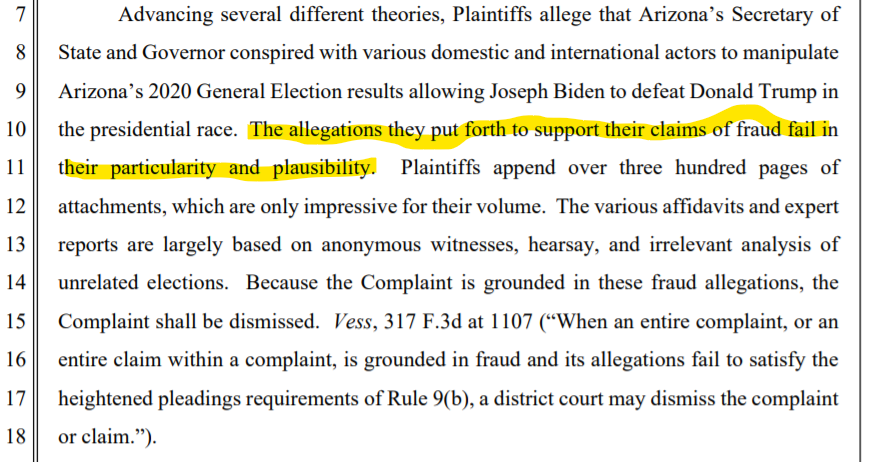
King vs. Whitmer (Michigan, Sidney Powell case)
"Nothing but speculation and conjecture"
This is a good one to show people who think affidavits are good evidence. Notice how the affidavits don't actually say they saw fraud happen in Detroit.
3/
https://t.co/NZAtqivWkL
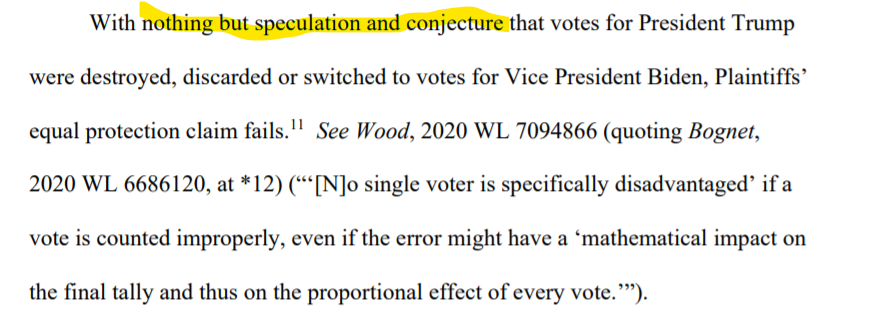
Trump v. Benson (Michigan)
"hearsay within hearsay"
Another good one to show people who think affidavits are absolute proof.
4/
https://t.co/17GeGhImHF
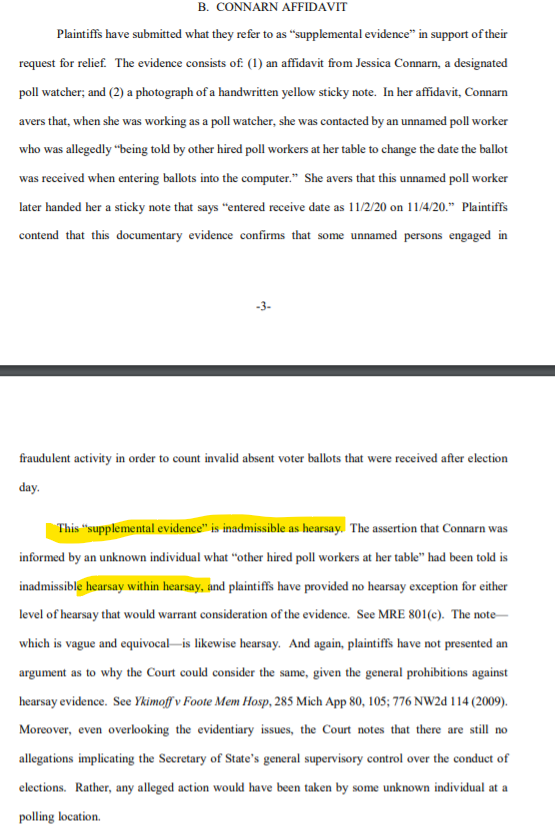
Stoddard v. City Election Commission (Michigan)
"mere speculation"
/5
https://t.co/ekqYEqiIL9

Over and over again, judges have gone out of their way to listen to the evidence and dismantle it, enjoy the carnage!
1/
Bowyer v. Ducey (Sidney Powell's case in Arizona)
"Plaintiffs have not moved the
needle for their fraud theory from conceivable to plausible"
This is a great opinion to start with. The Judge completely dismantles the nonsense brought before her.
2/
https://t.co/F2vllUhM2G

King vs. Whitmer (Michigan, Sidney Powell case)
"Nothing but speculation and conjecture"
This is a good one to show people who think affidavits are good evidence. Notice how the affidavits don't actually say they saw fraud happen in Detroit.
3/
https://t.co/NZAtqivWkL

Trump v. Benson (Michigan)
"hearsay within hearsay"
Another good one to show people who think affidavits are absolute proof.
4/
https://t.co/17GeGhImHF

Stoddard v. City Election Commission (Michigan)
"mere speculation"
/5
https://t.co/ekqYEqiIL9

I was right. "Lawyer" starts out with name-calling and an insistence that trial is "unconstitutional". He's saying Trump's 1/6 speech was rather bland, and pretending that was the only thing the House managers talked about, and the managers were "slanderous."
Bilious bullshit.
"Lawyer" is arguing that since there were objections raised by Democrats to some of the vote counts in 2016, that means Trump didn't engage in sedition.
I'm not sure how that logic works.
Now they're running a Trump campaign commercial.
A bunch of whataboutism, contrasting patriotic music behind Trump's racist dogwhistles about "law and order" against Democrats making firey speeches with dark music.
He went to the moronic Gym Jordan argument that Trump couldn't have instigated insurrection if the violence was gonna happen anyway (without acknowledging Trump had been encouraging and building up to that violence for close to a year).
Bilious bullshit.
Trump's "lawyers" won't offer any sort of defense.
— DCPetterson (@dcpetterson) February 12, 2021
They will distract, deflect, distort and dissemble.
They'll engage in whataboutism and name-calling.
They'll call the trial "unconstitutional," even though the Senate decided it wasn't.
They won't engage with the facts.
"Lawyer" is arguing that since there were objections raised by Democrats to some of the vote counts in 2016, that means Trump didn't engage in sedition.
I'm not sure how that logic works.
Now they're running a Trump campaign commercial.
A bunch of whataboutism, contrasting patriotic music behind Trump's racist dogwhistles about "law and order" against Democrats making firey speeches with dark music.
He went to the moronic Gym Jordan argument that Trump couldn't have instigated insurrection if the violence was gonna happen anyway (without acknowledging Trump had been encouraging and building up to that violence for close to a year).
You May Also Like
A list of cool websites you might now know about
A thread 🧵
1) Learn Anything - Search tools for knowledge discovery that helps you understand any topic through the most efficient
2) Grad Speeches - Discover the best commencement speeches.
This website is made by me
3) What does the Internet Think - Find out what the internet thinks about anything
4) https://t.co/vuhT6jVItx - Send notes that will self-destruct after being read.
A thread 🧵
1) Learn Anything - Search tools for knowledge discovery that helps you understand any topic through the most efficient
2) Grad Speeches - Discover the best commencement speeches.
This website is made by me
3) What does the Internet Think - Find out what the internet thinks about anything
4) https://t.co/vuhT6jVItx - Send notes that will self-destruct after being read.
H was always unseen in S2NL :)
Those who exited at 1500 needed money. They can always come back near 969. Those who exited at 230 also needed money. They can come back near 95.
Those who sold L @ 660 can always come back at 360. Those who sold S last week can be back @ 301
Those who exited at 1500 needed money. They can always come back near 969. Those who exited at 230 also needed money. They can come back near 95.
Those who sold L @ 660 can always come back at 360. Those who sold S last week can be back @ 301
Sir, Log yahan.. 13 days patience nhi rakh sakte aur aap 2013 ki baat kar rahe ho. Even Aap Ready made portfolio banakar bhi de do to bhi wo 1 month me hi EXIT kar denge \U0001f602
— BhavinKhengarSuratGujarat (@IntradayWithBRK) September 19, 2021
Neuland 2700 se 1500 & Sequent 330 to 230 kya huwa.. 99% retailers/investors twitter par charcha n EXIT\U0001f602






